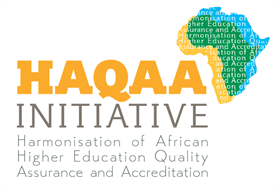Read this in: French Portuguese (Portugal) Arabic
Activities
The outline of activities are:
Phase 1: Developing a common understanding on QA in Africa (January 2016 – June 2017)
- Training Courses for a “common QA language”, targeting key African QA stakeholders and disseminators
- Set up of the Online African QA Platform
- Consolidation of an expert network on QA in Africa, spanning diverse key actors and stakeholders, and aggregating already exiting expert networks/databases for QA
- Mapping report on current/existing African QA ‘Standards and Guidelines’ (National level, East and West Africa)
Phase 2: Towards a Pan African QA and Accreditation System: Developing African Standards and Guidelines for quality assurance (ASG) and reinforcing institutional “internal” QA (June 2016 – June 2017)
- Technical Working Group to develop the ASG, supported by the Advisory Board
- Online consultation for the ASG
- Continental consultation workshop
- Training workshop(s) on the ASG
Phase 3: Consolidating ‘quality culture’ in Africa (February 2017 – April 2018)
- Visits to select African QA agencies/bodies, promoting the uptake and testing of the ASG – ‘Consultancy visits’ and ‘agency reviews’
- QA agency staff development workshop
- Institutional quality culture support through institutional evaluations, building capacity for institutional self-assessment
- Promoting AQRM as a tool for self- evaluation
Phase 4: Sustainability and further development of the Pan African QA and Accreditation System (February 2018 – September 2018)
- Endorsement of external review model for QA agencies in Africa (proposed by Technical Working Group)
- Regional conference, reinforcing ‘AQAF’ as an annual continental forum
- Consolidation of African QA Platform/Database and Capacity Development Centre as major continental tools and structures
Methodology
Read this in: French Portuguese (Portugal) Arabic
The methodological approach considered the different facets of the African QA and Accreditation Framework (PAQAF) that is under development and currently backed at African Union level. It simultaneously reinforced national quality assurance agencies/bodies (QAAs) and higher education institutional quality culture and planted the seeds for aligning different existing regional QA initiatives (East Africa, for example) with PAQAF. The methodology is premised on the following principles, which are inherent to the way in which the activities are designed:
- The Initiative is rooted in not only African stakeholder buy-in but also African organisational capacity to sustain the endeavour. This is why AAU has set up an ‘Africa Centre for Capacity Development in QA’ which channeled a number of the training activities that the Initiative facilitated. Furthermore, AAU had a critical role in pan-African stakeholder communication, driving the QA Platform and also facilitating the conception, communication and registration of events that were organized.
- As a means to maximize impact, synergies with other current African QA-related initiatives, especially those that are EU and AUC supported, were critical
– Many activities were planned alongside continental and regional events in Africa, such as the African Quality Assurance Forum (‘AQAF’), ‘COREVIP’ (AAU Conference of African Vice Chancellors) and also AUC, and UNESCO related events.
– There are key synergies with TUNING events, another important initiative supported by the EU under the EU-Africa Strategic Partnership
- A number of activities have required training delivered by QA experts. Such training and knowledge transfer has come not only from European experts but also from experts from other African countries that had good practice to share. This contributed to internal African knowledge transfer.
- Knowledge transfer has been bi-directional
– The Implementing Consortium used its European dissemination and policy channels to ensure that the African QA experience were also shared in Europe and that many of the activities planned also incorporated a discussion on how Africa-European collaboration and mutual exchange around the topic of QA can be enhanced. This underpined the EU-Africa Strategic Partnership and also benefit the European Higher Education Area (EHEA)
- Emphasis was placed on engaging countries, organisations and institutions that have participated less frequently in the past in African continental activities, so as to bring some countries/individuals ‘up to speed’.
- Participants were also be encouraged to avail of EU-funded programmes targeting higher education and Africa such as Erasmus, the the Marie Skłodowska-Curie Actions and the Intra-Africa Academic Mobility Scheme to further implement and enhance work in these fields.




